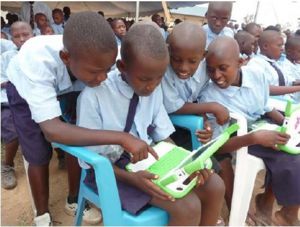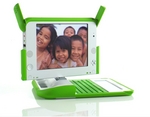The OLPC Wiki: Difference between revisions
No edit summary |
|||
| (672 intermediate revisions by 76 users not shown) | |||
| Line 1: | Line 1: | ||
Our Wiki is now an archive of documentation. |
|||
{{OLPC}} |
|||
* 20th July 2024 - upgrade to web server. editing is enabled for identified users. [[User:Quozl|Quozl]]. |
|||
| ⚫ | |||
* 9th November 2022 - lots of spam from a user registered in 2006, and no other editing has been going on, so editing is disabled. [[User:Quozl|Quozl]]. |
|||
==OLPC News== |
|||
* 23rd November 2021 - we upgraded and moved this Wiki to another server. [[User:Quozl|Quozl]]. |
|||
* 27th October 2021 - we plan to make this Wiki read-only. [[User:Quozl|Quozl]]. |
|||
* 9th December 2013 - user account registration turned off due to persistent spam, you have to contact us. [[User:Quozl|Quozl]]. |
|||
---- |
|||
[[Image:1st working.jpg|frame|left]] |
|||
{{Translations}} |
|||
{| width="100%" cellpadding=2 cellspacing=0 style="padding-top: 10px; padding-bottom: 5px;" |
|||
|- |
|||
|valign="top" width="160px" style="padding-top:11px;"| |
|||
[[Image:Green_and_white_machine.jpg|150px|left|XO: The Children's Machine]] |
|||
|valign="top" | |
|||
The [[One Laptop per Child]] non-profit develops a low-cost laptop—[[XO|the "XO Laptop"]]—to revolutionize how we educate the world's children. Our [[Mission|mission]] is to provide educational opportunities for the world's most isolated and poorest children by giving each child a rugged, low-cost, low-power, connected laptop; and [[activities|software tools and content]] designed for collaborative, joyful, self-empowered learning. |
|||
OLPC has produced XO laptops for more than 3 million children around the world, the majority of them in [[OLPC Uruguay|Uruguay]], [[OLPC Peru|Peru]], [[OLPC Rwanda|Rwanda]], [[OLPC Haiti|Haiti]], Australia, [[OLPC Mongolia/Ulaanbaatar|Mongolia]] and the [[OLPC Birmingham|United States]]. These laptops all run [[Sugar]] and [[Fedora Linux]], and have customized software and content builds developed by their national deployment teams in collaboration with OLPC staff. We maintain a regular update of [[Deployments|deployment information]]. |
|||
The first working prototype of the $100 Laptop was unveiled at the [[Country Task Force Meeting]], 23 May 2006. (See [http://www.flickr.com/photos/pete/sets/72057594143224765/ Flickr] for more images.) This was first time we had combined the |
|||
industrial design with the hardware (A-TEST board). Both the ID and the hardware had been shown separately in the past; pictured is the working |
|||
laptop, completely self-contained, running Fedora Core 5.0. |
|||
|valign="top" width="210px"| |
|||
One thing that might be somewhat misleading is the display; we plan to ship a display that is bigger and of a higher resolution than the one pictured. We plan to ship a 7.5-inch diagonal display with 1200×900 pixels vs. the 7.0-inch diagonal display with 800×480 pixels seen in the prototype. |
|||
{{Latest Releases}} |
|||
|} |
|||
{| cellpadding=3 cellspacing=1 |
|||
==About One Laptop per Child== |
|||
|width="50%" valign="top" style="background:#f5fffa; border:1px solid #cef2e0;"| |
|||
{| id="mp-left" style="width:100%; vertical-align:top; background:#f5fffa;" |
|||
! style="padding:2px" | <h2 id="mp-tfa-h2" style="margin:3px; background:#d0e6f9; font-size:120%; font-weight:bold; border:1px solid #a3bfb1; text-align:left; color:#000; padding:0.2em 0.4em;"> Quote of the Day</h2> |
|||
|- |
|||
|style="color:#000;"| |
|||
<div style="border:1px solid #f5fafe; margin:2px; padding:10px; font-size:120%;"> |
|||
"This is not just a matter of giving a laptop to each child, as if bestowing on them some magical charm. The magic lies within -- within each child, within each scientist, scholar, or just plain citizen in the making. This initiative is meant to bring it forth into the light of day." <br/> <span style="float:right; font-size:100%;"> —Kofi Annan</span> |
|||
<br/> |
|||
</div> |
|||
|} |
|||
| style="border:1px solid transparent;" | |
|||
''It's an education project, not a laptop project''—[[Nicholas Negroponte]] |
|||
|width="50%" valign="top" style="background:#f5faff; border:1px solid #cedff2;"| |
|||
This is the wiki for the One Laptop per Child association. The mission of this non-profit association is to develop a low-cost laptop—the "$100 Laptop"—a technology that could revolutionize how we educate the world's children. Our goal is to provide children around the world with new opportunities to explore, experiment, and express themselves. |
|||
{| id="mp-right" style="width:100%; vertical-align:top; background:#f5faff;" |
|||
! style="padding:2px" | <h2 id="mp-itn-h2" style="margin:3px; background:#dfcef2; font-size:120%; font-weight:bold; border:1px solid #a3b0bf; text-align:left; color:#000; padding:0.2em 0.4em;">Current projects</h2> |
|||
|- |
|||
| style="margin:2px; padding:10px;" | |
|||
The [[Contributors|Contributors program]] offered free XO laptops to developers and content creators who are working on projects that will benefit deployments worldwide. To apply for this program, contributors submitted a [[Contributors program/Project proposal form|description of the work]] they are planning along with their contact information. |
|||
Read more about our [[deployments]], the latest [[Sugar|sugar release]] and the new [[XO-4 Touch|XO-4 Touch laptop]], or other [[projects]]. Follow our [http://blog.laptop.org news] and submit new stories. To suggest your own project, submit a [[Contributors|project proposal]] directly. |
|||
Why do children in developing nations need laptops? Laptops are both a window and a tool: a window into the world and a tool with which to think. They are a wonderful way for all children to learn learning through independent interaction and exploration. |
|||
|} |
|||
|} |
|||
==What you'll find inside== |
|||
<br style="clear:all;"/> |
|||
[[Image:Annan-sachs-bonsaaso.jpeg|thumb|Kofi Annan and Jeff Sachs visit students in [[OLPC Ghana|Bonsaaso, Ghana]] ]] |
|||
A good place to start exploring this wiki is the '''[[One Laptop per Child]]''' page, which gives an overview of the project. There is a list of '''[[OLPC FAQ|frequently asked questions (FAQ)]]'''; a place to '''[[Ask OLPC a Question|ask a question]]'''; and numerous pages on [[Hardware specification|hardware]], [[Software|software]], and [[Educators|content]]—and a separate [http://dev.laptop.org/wiki wiki for software development]. There are also discussion pages on issues of deployment and country-specific discussions. An extended '''[[Table of Contents|table of contents]]''' is also available. |
|||
[[Image:001_Arahuay.JPG|thumb|School break at the [[Educators|pilot]] in [[OLPC Peru/Arahuay|Arahuay, Perú]] ]] |
|||
[[Image:Classroom2.jpg|thumb|OLPC project in [[OLPC_Ethiopia|Ethiopia]] ]] |
|||
== |
== Get Involved == |
||
This Wiki contains project pages describing work and ideas related to OLPC. Learn how to [[participate|get involved]] with those already in progress. You can also [[communication channels|ask]] other community members about ways to contribute. |
|||
The purpose of this wiki is to both share information about the project and to solicit ideas and feedback. The articles and discussion vary from technical to epistemological. We invite comments on every page (please use the "discussion" tab at the top of each page). Please restrict edits to the article pages themselves to facts, not opinions. You are encouraged to sign your work and to make liberal use of citations and links. (Please feel free to make an account and please use <nowiki>~~~~</nowiki> as a signature for your comments.) Please note that pages that include the <nowiki>{{OLPC}}</nowiki> template—such as this one—are maintained by the OLPC team and are generally representative of the current state of the project. Other pages—created and maintained by the public—should be read with that in mind. |
|||
See our latest [http://planet.laptop.org community news] and [[OLPC:News|accomplishments]]. |
|||
| ⚫ | |||
<br style="clear:all;"/> |
|||
== Overviews == |
|||
{{overviews-nav}} |
|||
<!--<div style="float:right; border:0px solid #eff; margin: 10px 0px 10px 30px;">{{support-nav}}</div>--> |
|||
There are overview pages dedicated to [[Hardware specification|hardware]], [[software_components|software]], [[educators|education]] and [[content|content]]. |
|||
The XO's iconic software interface, [[Sugar]], has its own [[OLPC Human Interface Guidelines|human interface guidelines]], here and on [http://wiki.sugarlabs.org/go/Human_Interface_Guidelines the Sugar Labs wiki]. There are also discussion pages on issues of [[Deployments|deployment]] and [[Countries|country-specific]] discussions. |
|||
OLPC is designed around five [[core principles]] — [[core principles#Child Ownership|Child Ownership]], [[core principles#Low Ages|Low Ages]], [[core principles#Saturation|Saturation]], [[core principles#Connection|Connection]], and [[core principles#Free and Open Source|Free and Open Source tools]], and each of these have their own portal sections as well. |
|||
<br style="clear:left;"/> |
|||
[[Image:StartOfMP.jpg|thumb|Start of mass production at [[Quanta]] ]] |
|||
== News and updates == |
|||
{{news-nav}} |
|||
* [[Persistent_developer_key_firmware|Persistent developer key firmware]] released October 2021 to disable the security systems, |
|||
* A build of Android for the XO-4 is available, see [[Android]], |
|||
* A community project for using XOs as class or school servers has begun, please get involved, see [[XS Community Edition]], |
|||
* The [http://blog.laptop.org/2013/07/16/family-oriented-xo-tablet-debuts-at-walmart-for-149/ XO Learning Tablet] debuted in July, 2013. |
|||
* The [[XO-4|XO-4 Touch laptop]] entered production in February, 2013. |
|||
* 2012 brought our [http://olpcSF.org/summit global community summit] Oct 19-21 and follow-on implementers' [http://wiki.sugarlabs.org/go/Sugarcamp_SF_2012 San Francisco Sugarcamp++] Oct 22-24 -- all were invited to both events! |
|||
* The [[XO-1.75|XO-1.75 laptop]] entered production in February, 2012. |
|||
* [[OLPC Uruguay|Uruguay]] became the first country in the world to achieve one laptop per child, when its President Tabaré Vázquez handed out 400,000 XOs to the remaining school children on October 13, 2009. |
|||
* For general news, see some of the OLPC news aggregators, including [http://planet.laptop.org planet.laptop.org], [http://blog.laptop.org the OLPC blog], and the independent [http://olpcnews.com OLPCNews] blog. |
|||
[[Image:rwanda 0709.jpg|thumb|right| [[OLPC Rwanda]] launches at Kagugu Primary School in Kigali]] |
|||
[[Image:P1020317-1.JPG|thumb|right| Laptops are introduced in [[OLPC Mongolia|Mongolia]] ]] |
|||
| ⚫ | |||
| ⚫ | |||
__NOEDITSECTION__ |
|||
Latest revision as of 05:58, 20 July 2024
Our Wiki is now an archive of documentation.
- 20th July 2024 - upgrade to web server. editing is enabled for identified users. Quozl.
- 9th November 2022 - lots of spam from a user registered in 2006, and no other editing has been going on, so editing is disabled. Quozl.
- 23rd November 2021 - we upgraded and moved this Wiki to another server. Quozl.
- 27th October 2021 - we plan to make this Wiki read-only. Quozl.
- 9th December 2013 - user account registration turned off due to persistent spam, you have to contact us. Quozl.
| english | عربي | پښتو | български | deutsch | español | français | kreyòl ayisyen | italiano | 日本語 | 한국어 | монгол | Bahasa Melayu | नेपाली | norsk | português | română | русский | kinyarwanda | türkçe | 中文 | 繁體中文 | HowTo [ID# 302845] +/- |
|
The One Laptop per Child non-profit develops a low-cost laptop—the "XO Laptop"—to revolutionize how we educate the world's children. Our mission is to provide educational opportunities for the world's most isolated and poorest children by giving each child a rugged, low-cost, low-power, connected laptop; and software tools and content designed for collaborative, joyful, self-empowered learning. OLPC has produced XO laptops for more than 3 million children around the world, the majority of them in Uruguay, Peru, Rwanda, Haiti, Australia, Mongolia and the United States. These laptops all run Sugar and Fedora Linux, and have customized software and content builds developed by their national deployment teams in collaboration with OLPC staff. We maintain a regular update of deployment information. |
|
|
|
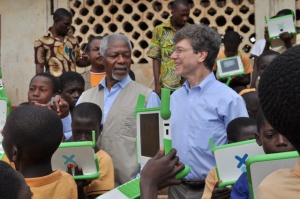
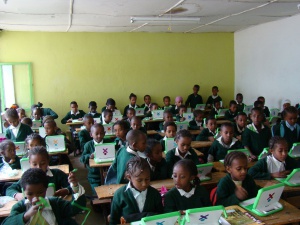
Get Involved
This Wiki contains project pages describing work and ideas related to OLPC. Learn how to get involved with those already in progress. You can also ask other community members about ways to contribute.
See our latest community news and accomplishments.
Overviews
There are overview pages dedicated to hardware, software, education and content. The XO's iconic software interface, Sugar, has its own human interface guidelines, here and on the Sugar Labs wiki. There are also discussion pages on issues of deployment and country-specific discussions.
OLPC is designed around five core principles — Child Ownership, Low Ages, Saturation, Connection, and Free and Open Source tools, and each of these have their own portal sections as well.
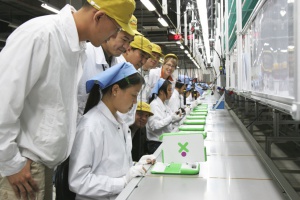
News and updates
Weekly news · OLPC Planet · News archive +
- Persistent developer key firmware released October 2021 to disable the security systems,
- A build of Android for the XO-4 is available, see Android,
- A community project for using XOs as class or school servers has begun, please get involved, see XS Community Edition,
- The XO Learning Tablet debuted in July, 2013.
- The XO-4 Touch laptop entered production in February, 2013.
- 2012 brought our global community summit Oct 19-21 and follow-on implementers' San Francisco Sugarcamp++ Oct 22-24 -- all were invited to both events!
- The XO-1.75 laptop entered production in February, 2012.
- Uruguay became the first country in the world to achieve one laptop per child, when its President Tabaré Vázquez handed out 400,000 XOs to the remaining school children on October 13, 2009.
- For general news, see some of the OLPC news aggregators, including planet.laptop.org, the OLPC blog, and the independent OLPCNews blog.
